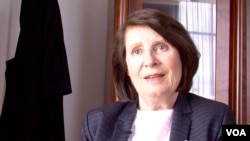First came the videos, half a dozen graphic spots re-enacting "real life" racist and anti-Semitic acts. Then giant posters appeared along roads and transportation hubs literally offering a black-and-white message about workplace discrimination.
A year after France’s leftist government announced a three-year, $115 million plan to fight racism and anti-Semitism, a pair of national publicity campaigns are taking aim at the issue.
“We had no choice but to act very thoroughly and effectively against increased threats,” notably far-right hate speech and virulent anti-Semitism from a “tiny minority” of radical Muslims, says Gilles Clavreul of DILCRA, an inter-ministerial office that works to counter racism and anti-Semitism in France.
The government plan includes an array of proposals, from deepening sanctions and the Internet fight against hate speech, to launching school and citizen education programs.
Despite an overall increase in hate acts last year, Clavreul cites signs of progress. New figures in May show what he calls a "significant" drop in anti-Semitic and anti-Muslim acts.
A report released by France’s National Consultative Commission of Human Rights (CNCDH) also finds an increase in French tolerance of diversity, even after a year bracketed by two Islamist terrorist attacks in Paris.
“There is a need for fraternity and social cohesion that is making people open up to those who are different,” says the commission president, Christine Lazerges. Looking more closely at last year’s figures, she adds, anti-Muslim acts peaked after each terrorist attack, but were generally on par with previous years.
Long road to tolerance
France is not the only European country grappling with intolerance. Far-right groups are gaining ground across Europe, feeding on the immigration crisis and rising fears of militant Islam. In March, the Council of Europe warned hate speech in France has “become commonplace.”
The issue is all the more sensitive since France has the region’s largest communities of Muslims and Jews, many of North African extraction.
While the government's communications campaigns have drawn mixed reviews, most observers agree on one thing: it will take much more than a three-year crusade to bring about a more tolerant and egalitarian society.
“There’s a real political will, but it will take 20 years to achieve success,” Lazerges says, describing major changes needed in the educational system and in turning around France’s disenfranchised suburbs.
Backing her assessment are 2015 government statistics that show hate offenses jumped by more than one-fifth in 2015 to more than 2,000, compared to the year before. Anti-Muslim acts and threats tripled last year. Activists say the true figures are higher, since many acts go unrecorded.
Other forms of discrimination are more subtle. An October survey on French hiring by the Montaigne Institute, a Paris-based research group, finds Christian men are four times more likely to get a call back from job recruiters than Muslims. Jews also face discrimination, but to a lesser extent.
“It’s a very serious phenomenon,” said Montaigne’s deputy director, Angele Malatre-Lansac, pointing to study estimates showing discrimination against Muslims in France was far higher than against African-Americans in the United States.
In many cases, she says, employers are fearful of the country’s staunchly secular laws, and uncertain how to treat religious expression, like Muslim prayers, at work. “It’s not necessarily that racism is pervasive, but religious practice can make recruiters afraid,” she said.
In March, the government launched six 30-second TV spots re-enacting "real life" racist and anti-Semitic acts including: distraught Muslims finding a pig’s head stuck to a mosque gate, a black man being beaten up, and “Death to Jews” scrawled on a synagogue door.
“We had to create a shock, to say, ‘Hey, stop; we have to address these issues,’" said Clavreul.
Nonetheless, some anti-discrimination groups have criticized the spots as offering a narrow, violent take on the subject.
“It can be even counterproductive, because we’ve worked for years to show that racism is subtle, and even those who are not racist can have humiliating, wounding words,” adds Lazerges.
“Publicity spots are good; they can help educate people,” says Abdallah Zekri, head of the Observatory Against Islamophobia. “But how many people were arrested; how many people were found guilty?”
Others look for results
Roger Cukierman, president of the Jewish umbrella group CRIF, says education is what’s needed must.
“The task is immense, because the atmosphere is such that Jews are not sending their children to French public schools anymore,” he says, describing cases of Jewish students who do attend being insulted and beaten. “It’s impossible to change the atmosphere just by a ministerial decree.”
The government has taken a different approach with its second campaign, rolled out in mid-April. Giant posters portray job seekers with their faces split in half, white and non-white, with the tagline, “Skills First.” Next to the white side are messages like, “You start Monday.” On the non-white: “You don’t have the profile.”
While awareness-raising efforts are “excellent,” Malatre-Lansac says, “The question is how will this action be followed in the long term?”
“If there’s work to be done, it has to be done at the grassroots level,” says Yasser Louati, spokesman for the Collective Against Islamophobia, who believes state-organized campaigns to fight it cannot work.
Clavreul notes efforts in southern France to get businesses to hire locally, and to harness volunteerism for school education and job mentoring programs.
“We don’t have a one-sided strategy,” he adds. “We are very pragmatic. We have to be holistic in our approach.”






